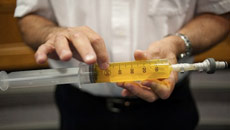Impulsive people are at greater risks of food and drug addition as impulsivity is a result of cellular activities in the part of the brain involved with reward and not a result of dysfunctional eating behaviour, a study indicated.
The impulsive models showed increased expression of a transcription factor called Delta-FosB in the nucleus accumbens, an area of the brain involved in reward evaluation and impulsive behaviour, thus indicating a potential biological component to this behaviour.
"Our results add further evidence to the idea that there are similar mechanisms involved in both drug and food addiction behaviour," said Clara Velazquez-Sanchez,a postdoctoral fellow at Boston University School of Medicine (BUSM) in the US.
The researchers measured the inability to withhold an impulsive response in experimental models that were exposed to a diet high in sugar daily for one hour.
Models shown to be more impulsive rapidly developed binge eating traits, showing heightened cravings and the loss of control over the junk diet (measured as inability to properly evaluate the negative consequences associated with ingestion of the sugary diet).
Conversely, models shown to be less impulsive demonstrated the ability to appropriately control impulsive behaviour and did not show abnormal eating behaviour when exposed to the sugary diet.
"While impulsivity might have aided ancestors to choose calorie-rich foods when food was scarce, our study results suggest that, in today's calorie-rich environment, impulsivity promotes pathological overeating," said Pietro Cottone, an associate professor of pharmacology and psychiatry at BUSM.
The study appeared in the journal Neuropsychopharmacology.






